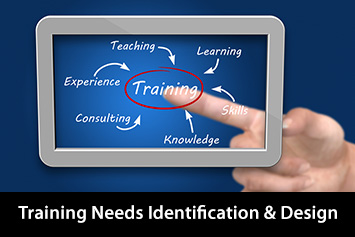Training Needs Identification and Design (Level 6)
€395.00 — or €199.00 / month for 2 months
- Award Achieved: QQI Level 6 component Certificate in Training Needs Identification & Design (6N3325).
- NFQ Credit Value: 15 credits.
- Format: Full eLearning course supported with fully qualified tutors & accredited by QQI.
- Course Fee: Only – €395 or
- Easy Payments: Only €199 per month over 2 months with our unrivalled Easy Payment Plans. Enrol using your Debit / Credit Card or call us on (+353) 1 206 1828 to avail of this offer.
- The course fee includes all documentation, lecturing, assessments, learner registration and QQI certification fees. No other hidden fees to pay!
- Students can complete this course within 8 weeks which is ample time and can start it at any time of the year that is convenient.
- No classes to attend.
- 2nd Part of Special Purpose Award – Training & Development (6S3372).
Course Description
The purpose of this eLearning QQI Training Needs Identification & Design 6N3325 award is to develop an understanding of the methodologies and processes available to approach Training Needs Identifications and Design.
We will do this by equipping the learner with the knowledge, skill and competence to identify training and development needs. They will achieve this based on specific goals, within an organisations and or at an individual level and go on to Design, Plan and Implement a training schedule. We will explore the scope of training delivery and development design to meet those needs.
We will look at “best practice” in approaching Training Needs Identification and Design, looking at generic approaches to assess the Gap in skills, as identified, based on the target goals “to be” and the current “as is” status of the organisation and learners at the outset. Extracting the relevant data from your assessment, and using this to design the most appropriate training, to be delivered at the right level, using the most effective approach, and the right tools to ensure high quality training is delivered in a timely fashion falling within a manageable budget.
We will also teach evaluation models, approaches, techniques and tools as well as a range of training aids. We will explore how to approach the provision of constructive feedback to participants as well as specialised training delivery and evaluation skills. Finally, we will review the training evaluation process.
This interactive training programme is written, designed and delivered by trainers who are passionate about training and are committed to providing internationally recognised qualifications that will help advance your career and make you stand out from the crowd!
This course is fully delivered through our industry leading eLearning platform with learning formats that include for example – tutor videos, written course work and quizzes.
This Training Needs Identification & Design award is the second part for the new Special Purpose Award (30 Credits) – Training & Development Special Purpose Award (6S3372).
Existing Trainers or Learners who have completed the QQI Level 6 Training Delivery & Evaluation (6N3326) module can gain an exemption* through us for the first part of the Special Purpose Award and by combining it with this Training Needs Identification & Design module the learner will receive the higher QQI 30 Credit – Training & Development (6S3372) Special Purpose Award.
This new Special Purpose Award overtime will become the standard requirement for trainers working on all ETB/SOLAS funded training.
*Please Note: Exemption of the module (6N3326) must be no more than 5 years old at time of certification of the Special Purpose Award.
Course Details
Topics covered include:
Unit 1:
- How to assess the organisations internal culture and work environment
- Assess how these processes, standards and attitudes will impact on your training assessment and design.
- Identifying the business structure and how this impacts on training design (Case Studies of).
- Presenting a design solution that supports the internal cultural and corporate standards, with a focus on what your audience perceives to be important.
- Translating how you will approach the delivery of a training solution into the language of the organization you are working for with their priorities and key performance indicators in mind.
Unit 2:
- The History of training and education and the difference between them.
- The influencing factors and purpose of training
- The theorists that outlined the approaches to learning and personal development
- How to apply the theories in your approach to training.
Unit 3:
- The benefits of a structured approach to TNA, Quality, Cost and Time.
- Training Needs Analysis (TNA) Methodologies.
- Work Breakdown Structures (WBS) and other methods.
- Capturing the correct information in sufficient quantity to be representative of the training required.
Unit 4:
- Changing the perception of training and what it delivers
- Presentation of the training solution in tangible terms to the organisation.
- Identification and Assessment of training based on performance goals.
- Creating an environment that supports the application of new knowledge and skills after training has been complete
Unit 5:
- Identify Problem Needs.
- Determine Design of Needs Analysis.
- Collect Data.
- Analysing Data.
- Providing Feedback
- Developing an Action Plan.
Unit 6:
- The ISD model which is also known as ADDIE
- Kirkpatrick’s 4 Levels of Training Evaluation
- Merrill’s First Principles of Instruction
- Kemp’s Instructional Design Model.
Unit 7:
- The Theory of Training and How Adults Learn.
- How to set objectives and what mediums to use to achieve these objectives.
- Designing assessments and exercises and how to deliver them.
- Using Learning Aids, where, when and how.
- How locations and facilities effect learning.
- How to develop your presentation content, users guides, manuals and handouts, through multiple forms of media.
- Using modern interfaces, Tablets, PC’s, MAC’s, Interactive E-Books, and On-Line tools.
Unit 8:
- Personal Development Planning.
- Cascading Performance Goals.
- Performance management – Plan, Act, Review, Recognise.
Who should complete this QQI course?
- Newly qualified or appointed trainers.
- Those who wish to become a certified trainer or planning a career in Training & Development.
- Team Managers/Leaders.
- Staff involved in Training Delivery and Design.
- Those involved in training administration, delivery, design or assessment.
- Trainers who want to deliver training for National Training organisations – SOLAS, ETB’s etc.
- Training and HR personnel in large organisations.
- Those who need a credits towards other QQI Certificates.
Entry Requirements / Prerequisites::
-
Level 5 certificate or equivalent in a relevant subject area (Business/Training) and/or relevant practical experience (3 years minimum) – Please ask about our requirements surrounding Recognition of Prior Learning (RPL) for entry.
-
Mature students (over 23 years) may be exempt from the above prerequisites.
-
Participants must be working in or have access to a workplace where they will be able to complete a Training Needs Analysis and a Training Plan.
-
English Language Requirement: Students entering programmes leading to awards at Level 6 are expected to be able to: fluently read, draft, prepare and understand complex information, including quantitative information, that is personally relevant and reflecting a broad knowledge base. For example, this might include text and other information relating to abstract theoretical ideas, concerns or procedures, such as local planning concerns in relation to broader spatial strategy, political issues in relation to particular agenda, budget plans/ specifications.
-
Learners undertaking this programme must have basic IT skills and access to the necessary equipment to enable them to undertake an online programme: computer, broadband, email, Microsoft, recording equipment necessary for some skills demonstration tasks, and where applicable any other specialised software/equipment.
<li
-
For more details on participation suitability of this course click here».
As this programme is delivered through distance learning or eLearning, students must be capable of studying on their own initiative.
Transfer and Progression to Further Studies:
- Following successful completion you will receive a QQI Level 6 award in Training Needs Identification and Design (6N3325). You may use this award as credit towards the QQI Level 6 Training and Development Special Purpose Awards (ref. 623372).
Assessment
- This Programme is assessed through completion of a Project (60%), and Assignments (40%).
- As part of our quality assurance, assessment work will be marked by an Internal Assessor, then checked by an Internal Verifier and an independent QQI External Authenticator.
Accreditation
- Following successful completion you will receive a QQI Level 6 Training Needs Identification & Design component Certificate (6N3325).
- QQI (Quality & Qualifications Ireland) is the national awarding body for further education and training in Ireland. The Open College is registered with QQI to offer programmes leading to QQI awards in the National Framework of Qualifications in Ireland. Click here for details of the National Framework of Qualifications.
- Click here for more detailed Accreditation information.
Delivery Format
This Training Needs Identification & Design 6N3325 – (QQI Level 6) course is completed through Online Learning and there are no lectures to attend.
Students can complete this course within 8 weeks which is ample time and can start it at any time of the year that is convenient. If students need to extend this period for any reason during or near the end of the course they can request an extension through the college.




